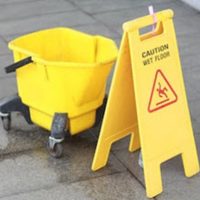Do ‘Wet Floor’ Signs Protect Businesses From Slip-And-Fall Injuries?

The short answer to this question is ‘not entirely.’ When a business posts a wet floor sign and a customer slips and falls, the sign is just one of the many factual circumstances that will make up the case. Liability claims are often much more complicated than they may initially appear. The outcome will depend heavily on all of the factual circumstances that go along with the sign and the fall.
To determine liability in slip-and-fall cases, we follow what is called “general negligence theory.” This would mean that one party is legally responsible for another at the time of the injury, falling under the umbrella of “premises liability”. Business owners have a legal duty to follow certain safety standards and to operate their property in safe and secure way free of hazards. If they knowingly fail in that responsibility, resulting in an injury, they may be liable and would need to compensate the injured person.
However, it is on the injured person to prove that the business owner or their staff were aware of the dangerous conditions and didn’t do anything about it, which is called “actual knowledge”. They could also prove “constructive knowledge,” by way of circumstantial evidence that shows the condition had existed for long period of time, therefore the business should have discovered it and fixed it by then. Or they can show “constructive knowledge” if this is something that has occurred before. Perhaps people have even gone after the business for similar slip-and-fall cases in the past so they should have smartened up by now.
In conclusion, wet floor signs will not make or break a slip-and-fall case, but they can impact it. The sign will not provide 100% blanket protection to the business owner, but it can help them avoid full liability. Under Florida’s comparative negligence law, the amount of money an injured person can collect is determined by the percentage the court determines they were at fault. If the sign was right in front of the person and they didn’t heed its warning, they may not get anything. But if the sign was located at the end of a long aisle, that could be a different story. The bottom line is that while a wet floor sign will help a business escape premises liability claims, there are many more factors at play and the analysis of all factual circumstances will alone decide the outcome of the case.



